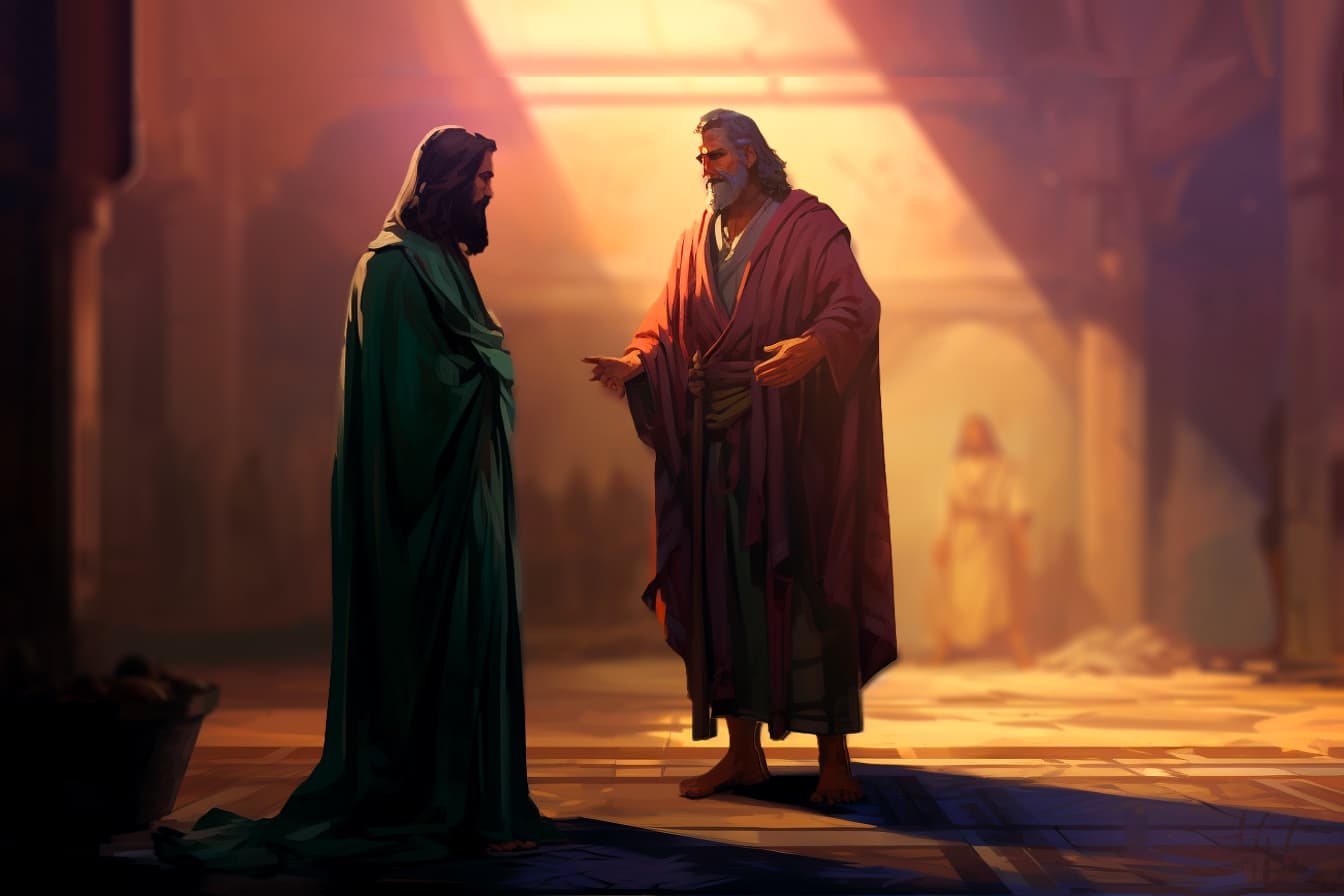Discover Jesus \ Events \The Private Examination by Pilate
Tag
The Private Examination by Pilate
Pilate, with John as Jesus' authorized companion, found the charges baseless, struggled to understand Jesus' claim, and saw him as innocent and falsely accused.

Table of Contents
Summary
Jesus and John were taken into Pilate’s quarters after the charges against him were read; John was the "one friend" that was authorized to accompany Jesus. Pilate reviewed each of the charges against Jesus, finding that they were baseless. When he asked Jesus about his claim to be a king, Jesus' answer was confusing to Pilate. He could not understand what Jesus was saying, but he knew that Jesus did not deserve to die. He saw Jesus as an innocent person and was falsely accused.
Pilate Interviews Jesus in Private
Jesus and John Zebedee were taken into Pliate’s quarters. John was permitted to accompany Jesus throughout his ordeal this Friday and was under Roman protection as the one friend that a prisoner was permitted to have with them. Pilate started his conversation with Jesus by telling him that he didn't believe the first accusation against him, which was that he was trying to corrupt the nation and incite rebellion. Then Pilate asked Jesus if he had ever taught that people shouldn't pay taxes to Caesar. Jesus, instead of answering directly, pointed to John and suggested Pilate ask him or others who had heard his teachings. Pilate then questioned John about this tax matter, and John confirmed that Jesus and his followers paid taxes to both Caesar and the temple. After talking to John, Pilate warned him not to tell anyone about their conversation, and John kept it a secret.
Pilate then turned to Jesus and asked about the third accusation: whether he was the king of the Jews. Jesus, seeing that Pilate might be genuinely curious, asked if Pilate was asking on his own or if he was repeating what Jesus' accusers had said. Pilate, somewhat indignantly, explained that he was not Jewish and that it was Jesus' own people and the chief priests who made the accusation and subsequently asked him to pass a death sentence. Pilate wanted to know the truth about these charges and whether Jesus had claimed to be the king of the Jews and sought to establish a new kingdom.
Then Jesus said to Pilate: "Do you not perceive that my kingdom is not of this world? If my kingdom were of this world, surely would my disciples fight that I should not be delivered into the hands of the Jews. My presence here before you in these bonds is sufficient to show all men that my kingdom is a spiritual dominion, even the brotherhood of men who, through faith and by love, have become the sons of God. And this salvation is for the gentile as well as for the Jew."
"Then you are a king after all?" said Pilate. And Jesus answered: "Yes, I am such a king, and my kingdom is the family of the faith sons of my Father who is in heaven. For this purpose I was born into this world, even that I should show my Father to all men and bear witness to the truth of God. And even now do I declare to you that every one who loves the truth hears my voice."
Then Pilate said, half in ridicule and half in sincerity, "Truth, what is truth – who knows?"
Pilate could not understand Jesus’ words, nor was he able to understand the nature of his spiritual kingdom, but he was now certain that the prisoner had done nothing worthy of death. Pilate was thoroughly convinced that, instead of being a dangerous political rabble rouser, Jesus was nothing more or less than a harmless visionary and an innocent fanatic.
Suggested Reading from this Essay

Related People
Pontius Pilate
The Roman Procurator
Jesus
Son of God, Son of Man. Creator Son of the Universe.
John Zebedee
Early apostle along with his brother, James.
Related Topics
The Kingdom of Heaven
The kingdom is a spiritual state that can be enjoyed now.
Related Locations
Jerusalem
Center of many pivotal moments in Jesus’ life.
Contributors
MaryJo Garascia, Mike Robinson, Gary Tonge
